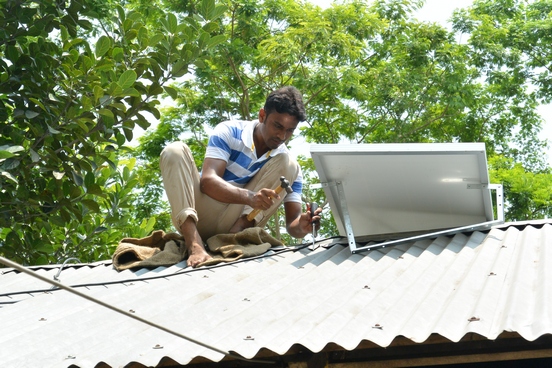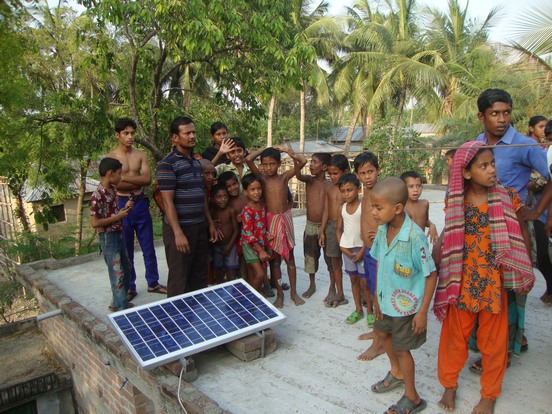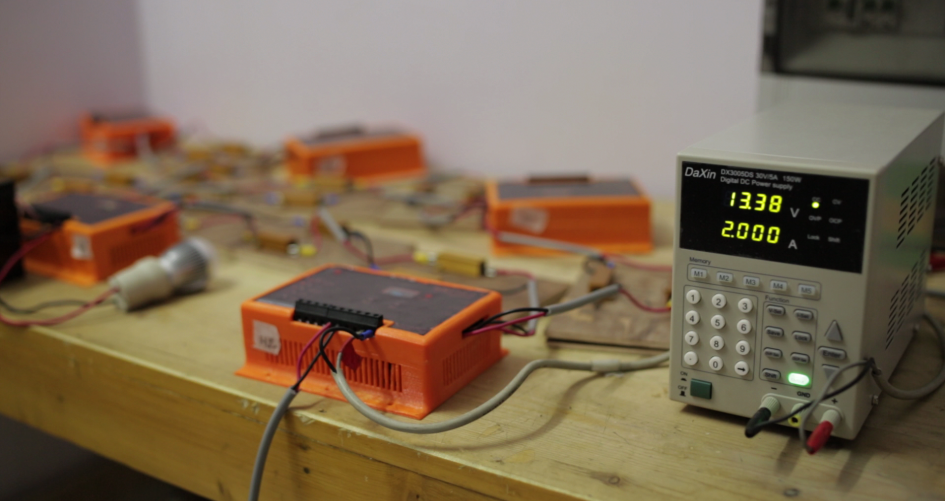Current solar home systems are limited in capacity and continue to remain prohibitively expensive for a large portion of the 65 million people who do not have access to the grid in Bangladesh. As a result, they rely on costly and unhealthy alternatives like diesel generators and kerosene lamps.
SOLshare has successfully piloted the world’s first ICT-enabled peer-to-peer electricity trading network for rural households with and without solar home systems in Shariatpur, Bangladesh. Along with its implementation partner, the NGO UBOMUS, its financing partner IDCOL and research partner United International Universit-Centre for Energy Research, SOLshare combines solar home systems and centralized mini-grids to enable more rural households to access renewable electricity at a lower cost.
The trading network interconnects households via a low-voltage DC grid and controls power flows through bi-directional metering integrated with an ICT backend; handling payment, customer service and remote monitoring. Each SOLshare meter enables the user to buy and sell renewable electricity with neighboring households, businesses and rural industries.
People in rural Bangladesh are now earning additional income by selling their surplus electricity and at the same time, new users have gained access to electricity for the first time in their life – without any large, centralized grid.
Key facts
- Trading renewable electricity through a SOLshare village grid can unlock at least up to 30% excess generation capacity of existing solar home systems. Through usage of the full power generation capacity, more people benefit from a clean, reliable source of electricity at a low cost.
- The SOLshare electricity trading platform turns the purchase of a solar home system into an investment with a return, enabling users to leverage excess generation from their solar home system and sell this to neighboring households, reducing the annual cost of energy access by at least 25%.
- SOLshare expects to operate more than 20,000 nanogrids by the end of 2030, which are expected to supply more than 1,000,000 customers in Bangladesh, including interconnecting them to the national grid through a single point of common coupling.
The problem
Bangladesh has a population of 163 million (or 29 million households). According to the International Finance Cooperation, the electrification rate is 41%, with 17 million households being off-grid. Of the off-grid population, the vast majority is concentrated in rural Bangladesh where the electrification rate dips to 28%.
Individual solar home systems are limited by their initial capacity and cannot serve more or any larger electricity consuming devices. Mini-grids, on the other hand, struggle to recover the large one-off capital expenditure necessary to implement them. These alternatives do not holistically address both the available finance for energy access interventions and the incremental growth in energy usage often observed after people are first electrified.

The solution
Based in Dhaka, SOLshare is a joint venture with the German consulting company MicroEnergy International GmbH. The SOLshare peer-to-peer electricity trading network enables the interconnection of households with and without solar home systems (SHS) into local electricity trading networks; increasing individual SHS utility by up to 30% and therefore providing more people with access to renewable electricity at a lower cost.
Each meter is installed in a household with or without an existing SHS. The device measures power inflows and outflows, contributes to overall grid control, allows for personal preferences of the users (i.e. buy or sell-only mode) and optimizes for battery state of charge. Interconnected SOLshare meters form a SOLshare electricity trading network, enabling peer-to-peer electricity trading in the village.
The ability of households to earn an income from their solar systems through the nanogrid opens up innovative business possibilities. For instance, households could reinvest their profits from solar energy trading to upgrade their solar technology to generate even more electricity and thus profit.
Overnight, simple solar users are turned into smart entrepreneurs earning money real-time once their solar systems start producing a surplus of solar electricity. This surplus can easily be directly credited to their mobile money accounts. For its operation model, SOLshare has long been hailed as the ‘Uber’ of the off-grid world.
The heart of the SOLshare electricity trading network is the back-end ICT-enabled data management and grid control system, which enables users to trade electricity, integrates mobile money infrastructure for remote payment, enables system monitoring and lockout and provides data analytics and grid optimization functionality.
By reducing the initial investment needed to access clean energy technologies and encouraging each user to buy and sell electricity, the SOLshare electricity trading network enables a bottom-up, micro-energy transition lead by the community itself.
Helping the planet
The SOLshare electricity trading network reduces greenhouse gas emissions from energy generation. It replaces unsustainable energy sources by: increasing access to renewable energy; connecting un-electrified users to solar-powered nanogrids; enabling the use of appliances with high energy demand; building sustainable business models around the appliances; and enabling parts of the agricultural value chain to be shifted to the local community level, thereby avoiding emissions from transportation.

Helping people
The ability to buy and sell electricity puts control directly into the hands of rural households. They are no longer simply beneficiaries of a rural electrification project or consumers of energy, rather, they are actors in the micro-energy transition within their community.
SOLshare enables rural villages in Bangladesh to power advanced community services which would require more energy than a usual SHS can provide. For example, schools, clinics and street lighting can be powered by pooling existing energy infrastructure. Higher energy availability creates an incentive for new productive-energy-use businesses to move to the village, bringing local jobs and improving the village economy. New business opportunities for the individual also arise from the possibility to invest incrementally in solar-PV and sell electricity to neighboring households, rural businesses and community facilities as demand grows in the electricity trading network.
A transparent electricity tariff ensures a lower monthly cost of electricity than available through an equivalent SHS. The project developer can microfinance individual SOLshare meters and additional generation or storage hardware, recovering cost via a monthly connection fee and a profit-share on electricity sold, all monitored and paid for via the SOLshare meters and ICT backend.
Spillover effect
The SOLshare grid concept can be applied in any under-electrified area in the Global South with a minimum of 10 households or small and medium enterprises located close to each other, making the concept applicable and scalable for millions of households worldwide.
In Bangladesh, based on the already 4+ million SHS installed in the field, SOLshare expects to operate more than 10,000 nanogrids by the end of 2030, which are expected to supply more than 1,000,000 customers in Bangladesh.




Images owned by the activity partners, all rights reserved.

